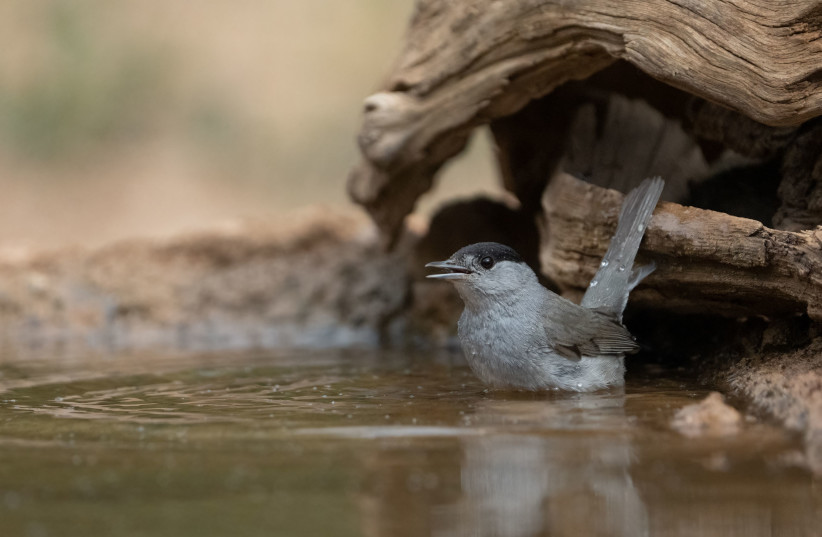Practice makes perfect, even for male birds who have sung for all of their lives. Singing involves probably the most complex – and mostly hidden – movements both humans and animals can make.
To become a good singer, you need to learn how to coordinate the movements of hundreds of muscles in your body with extreme exactitude, so you need a lot of talent, and practice.
We all know that athletes invest a lot of time exercising their limbs and body muscles. Professional opera stars and cantors in synagogues, among others, train the muscles in the voice box. But do songbirds do the same?
“Surprisingly, we know very little about the effects of exercise on these muscles and if they even react to training in humans,” said sound-production expert Prof. Coen Elemans from the University of Southern Denmark.
'Singing is crucial for songbirds'
No singer will let you come even near their precious voice box. He has led a new study in the prestigious journal Nature Communications titled, “Daily vocal exercise is necessary for peak performance singing in a songbird,” proving that male songbirds need to sing daily to exercise their vocal muscles and produce pretty songs – and the females notice if they didn’t.
“Singing is crucial for songbirds. They sing to impress future partners, to defend their territories and to maintain social bonds,” says Dr. Iris Adam, the study’s lead author. The researchers showed that training is necessary to keep songbird vocal muscles at top performance – and it is not just any training; it specifically is singing exercise that matters.

Elemans and Adam were assisted by an international team of researchers from their own university, Leiden University in Holland, the University of Umea in Sweden and the University of Vermont.
“It has long been known that songbird singing is controlled by fast vocal muscles, but until now, we only had very little knowledge if and how these muscles might respond to exercise as our leg muscles do,” noted Adam.
The researchers showed that if songbirds don’t use their vocal muscles at all, they get much slower and weaker within only a few days. But even when the birds only skip singing, the vocal muscles lose half of their strength after a week. “This was very surprising”, Adam added, “We were surprised that these muscles reacted so strongly and also how incredibly fast they lost performance. Indeed, it’s use it or lose it!”
When analyzing the songs sung, the team found that the birds sang differently before and after exercise. “You and I could barely hear a difference between the songs, but we saw clear effects when we analyzed our song recordings, Adam continued. As the ultimate test if this difference was important to the birds, the team next played songs to colorful, little female zebra finches (Taeniopygia castanotis) to see if they could hear a difference between before or after exercise and which song they liked more. The female zebra finches in the playback experiment could directly hear the difference, and 75% preferred the songs from the well-exercised male.” says Katharina Riebel, a coauthor and expert in animal behavior.
“Interestingly, these results provide an alternative reason why birds sing so much and every day,” Elemans suggested. Around the world, in spring and summertime, birds sing every morning in the daily dawn chorus. Why they do this is still puzzling to scientists. “A lot of that singing seems out of context. They sing when they don’t need to,” Adam said.
“Our results now show that if they don’t exercise every day, their muscle performance decreases,” Elemans commented. “On top of that, the lack of exercise is audible in their song, and the females prefer song from exercised males. Thus, songbirds may need to invest lots of time and energy in singing every day to remain attractive.”
This may be true for all animals. Vocal muscles need training programs different from leg muscles. The team made another very important discovery when studying the zebra finch's vocal muscles. “When we humans go to the gym to exercise leg and arm muscles, they typically get slower with exercise,” said Per Stål, a member of the team and an expert in human muscle exercise physiology. But in songbirds, vocal muscles don’t get stronger and slower with exercise, like limb muscles, but weaker and faster. This is opposite from normal limb and body muscles.”
“This reversed training may be a unique feature for vocal muscles that we think might be true for all vertebrates, including humans because all vocal muscles are developmentally related,” said Adam. Therefore, these findings can have major consequences for human speech therapy and vocal training.
Because it’s so challenging to study the physiology of human larynx muscles, therapeutic intervention is based on what we know from the exercise physiology of leg muscles. Training vocal muscles may thus work very differently, the team concluded. “Songbirds may be our best allies to study the physiology of vocal muscle to further improve voice training and rehabilitation in humans.”
The Environment and Climate Change portal is produced in cooperation with the Goldman Sonnenfeldt School of Sustainability and Climate Change at Ben-Gurion University of the Negev. The Jerusalem Post maintains all editorial decisions related to the content.
